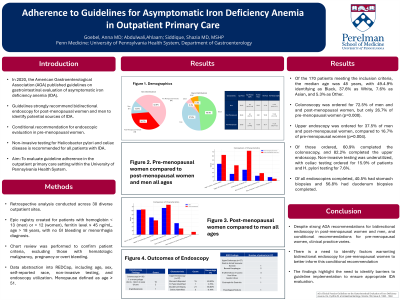Monday Poster Session
Category: GI Bleeding
P2466 - Adherence to Guidelines for Asymptomatic Iron Deficiency Anemia in Outpatient Primary Care
Monday, October 28, 2024
10:30 AM - 4:00 PM ET
Location: Exhibit Hall E

Has Audio

Anna Goebel, MD
University of Pennsylvania Health System
Philadelphia, PA
Presenting Author(s)
Anna Goebel, MD1, Ahlaam Abdulwali, 2, Shazia M. Siddique, MD, MSHP3
1University of Pennsylvania Health System, Philadelphia, PA; 2Macalester College, Eden Prairie, MN; 3University of Pennsylvania, Penn Valley, PA
Introduction: In 2020, the American Gastroenterological Association (AGA) published guidelines on the gastrointestinal evaluation of asymptomatic iron deficiency anemia (IDA). The guidelines strongly recommend that post-menopausal women and men undergo bidirectional endoscopy, to identify potential sources of IDA. For pre-menopausal women, the guidelines provide a conditional recommendation for endoscopic evaluation. The AGA advises non-invasive testing for Helicobacter pylori and celiac disease for all patients with IDA to rule out common causes of IDA.This study aimed to evaluate adherence to these guidelines in the outpatient primary care setting within the University of Pennsylvania Health System.
Methods: A retrospective analysis of outpatient encounters was conducted across 30 diverse sites.Using AGA's definition of patients with IDA, an Epic registry was created of patients with hemoglobin < 13 for men or < 12 for women, a ferritin level ≤ 45 ng/mL, age >18 years, and no diagnostic codes for GI bleeding or menorrhagia. Chart review was conducted to ensure patients met criteria. Patients with hematologic malignancy and pregnancy were excluded. Data were abstracted into REDCap including age, sex, self-reported race, as well as outcome variables of non-invasive testing and endoscopy utilization. Menopause was defined age ≥ 51.
Results: 171 patients met criteria for asymptomatic IDA. Median age was 48 years (IQR 39-62). Race was 49.7% Black, 37.4% White, 7.6% Asian, and 5.3% Other. 66.7% of men (n=21) and 74.6% of post-menopausal women(n=59) had a colonoscopy ordered, compared to 26.7% of pre-menopausal women(n=91) (p=0.000). For upper endoscopy was ordered for 64.3% of men and 35.6% of post-menopausal women, compared to 17.6% of pre-menopausal women (p=0.011). Of those with orders, 62.2% had a colonoscopy and 80.4% an endoscopy. For non-invasive testing, celiac testing was ordered in 7.6% and H. pylori testing in 15.8%. 57.14% of men had an encounter with a GI provider compared to 35.6% of post-menopausal women (p=0.087) and 13.2% of pre-menopausal women (p=0.000).
Discussion: Despite strong recommendations from AGA for post-menopausal women and men to undergo bidirectional endoscopy and conditional recommendations for pre-menopausal women, clinical practices vary. This suggests a need for increased efforts to align practice with guidelines, particularly for pre-menopausal women. These findings represent a need for identifying barriers to guideline implementation to ensure adequate IDA evaluation.
Note: The table for this abstract can be viewed in the ePoster Gallery section of the ACG 2024 ePoster Site or in The American Journal of Gastroenterology's abstract supplement issue, both of which will be available starting October 27, 2024.
Disclosures:
Anna Goebel, MD1, Ahlaam Abdulwali, 2, Shazia M. Siddique, MD, MSHP3. P2466 - Adherence to Guidelines for Asymptomatic Iron Deficiency Anemia in Outpatient Primary Care, ACG 2024 Annual Scientific Meeting Abstracts. Philadelphia, PA: American College of Gastroenterology.
1University of Pennsylvania Health System, Philadelphia, PA; 2Macalester College, Eden Prairie, MN; 3University of Pennsylvania, Penn Valley, PA
Introduction: In 2020, the American Gastroenterological Association (AGA) published guidelines on the gastrointestinal evaluation of asymptomatic iron deficiency anemia (IDA). The guidelines strongly recommend that post-menopausal women and men undergo bidirectional endoscopy, to identify potential sources of IDA. For pre-menopausal women, the guidelines provide a conditional recommendation for endoscopic evaluation. The AGA advises non-invasive testing for Helicobacter pylori and celiac disease for all patients with IDA to rule out common causes of IDA.This study aimed to evaluate adherence to these guidelines in the outpatient primary care setting within the University of Pennsylvania Health System.
Methods: A retrospective analysis of outpatient encounters was conducted across 30 diverse sites.Using AGA's definition of patients with IDA, an Epic registry was created of patients with hemoglobin < 13 for men or < 12 for women, a ferritin level ≤ 45 ng/mL, age >18 years, and no diagnostic codes for GI bleeding or menorrhagia. Chart review was conducted to ensure patients met criteria. Patients with hematologic malignancy and pregnancy were excluded. Data were abstracted into REDCap including age, sex, self-reported race, as well as outcome variables of non-invasive testing and endoscopy utilization. Menopause was defined age ≥ 51.
Results: 171 patients met criteria for asymptomatic IDA. Median age was 48 years (IQR 39-62). Race was 49.7% Black, 37.4% White, 7.6% Asian, and 5.3% Other. 66.7% of men (n=21) and 74.6% of post-menopausal women(n=59) had a colonoscopy ordered, compared to 26.7% of pre-menopausal women(n=91) (p=0.000). For upper endoscopy was ordered for 64.3% of men and 35.6% of post-menopausal women, compared to 17.6% of pre-menopausal women (p=0.011). Of those with orders, 62.2% had a colonoscopy and 80.4% an endoscopy. For non-invasive testing, celiac testing was ordered in 7.6% and H. pylori testing in 15.8%. 57.14% of men had an encounter with a GI provider compared to 35.6% of post-menopausal women (p=0.087) and 13.2% of pre-menopausal women (p=0.000).
Discussion: Despite strong recommendations from AGA for post-menopausal women and men to undergo bidirectional endoscopy and conditional recommendations for pre-menopausal women, clinical practices vary. This suggests a need for increased efforts to align practice with guidelines, particularly for pre-menopausal women. These findings represent a need for identifying barriers to guideline implementation to ensure adequate IDA evaluation.
Note: The table for this abstract can be viewed in the ePoster Gallery section of the ACG 2024 ePoster Site or in The American Journal of Gastroenterology's abstract supplement issue, both of which will be available starting October 27, 2024.
Disclosures:
Anna Goebel indicated no relevant financial relationships.
Ahlaam Abdulwali indicated no relevant financial relationships.
Shazia Siddique indicated no relevant financial relationships.
Anna Goebel, MD1, Ahlaam Abdulwali, 2, Shazia M. Siddique, MD, MSHP3. P2466 - Adherence to Guidelines for Asymptomatic Iron Deficiency Anemia in Outpatient Primary Care, ACG 2024 Annual Scientific Meeting Abstracts. Philadelphia, PA: American College of Gastroenterology.
